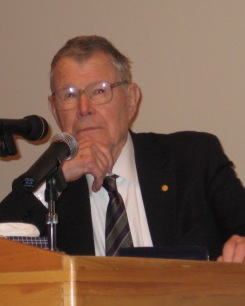
Thomas Schelling
1921-2016
The 2005 Nobel Prize in economic sciences was awarded to Thomas C. Schelling and Robert J. Aumann, ”for having enhanced our understanding of conflict and cooperation through game-theory analysis.” Schelling was a pioneer in behavioral economics, accomplishing significant and influential work in the ideas of coordination, commitment (both promises and threats), deterrence, focal points, and segregation.
Schelling’s early work was on the most important issue of the Cold War: preventing it from becoming a hot war. In his classic 1960 book, The Strategy of Conflict, Schelling laid out some important applications of game theory to the issue of nuclear war. In one passage, he discussed the U.S.-Soviet conflict in the terms of a hypothetical duel. He wrote “if both [duelists] were assured of living long enough to shoot back with unimpaired aim, there would be no advantage in jumping the gun and little reason to fear that the other would try it.” Thus “schemes to avert surprise attack have as their most immediate objective the safety of weapons rather than the safety of people.” This means that to have a credible deterrent against a Soviet first strike that would destroy many of its people, the U.S. government needed to defend its weapons first, rather than its citizens first. While the government may appear to be placing the value of its weapons above the lives of its citizens, the threat of deterrence is not credible if the weapons are exposed.
One of Schelling’s Harvard colleagues, Richard Zeckhauser, wrote:
Those who read Schelling and participate in his games learn a more general principle: In any interactive situation it is vitally important to look at matters from the side of other party. (The other-people’s-shoes approach is often recommended by soft-hearted promoters of compromise. The core principle, however, is that by understanding the other party’s perspective you will improve your comprehension of the situation dramatically and will come out better yourself. This is an important lesson for hard hearts as well.) Surprisingly, many parties to important negotiations never grasp this simple principle.1
Schelling developed another important concept in game theory: the significance of pre-commitment in interactions. An actor can be made better off if his choices are limited in advance. For example, a firm may invest in now-unneeded capacity to deter competitors from entering a market. Or a general may destroy a retreat route to signal to the enemy, and his troops, that he is committed to the coming battle. A bus driver who cannot physically open the fare box is safer than one who can.
Schelling studied the ability of actors to coordinate their behavior even when not able to communicate. He observed that coordinative solutions in games were arrived at more often than theory would predict. These “focal points” (sometimes called “Schelling points”) were reached frequently due to the actors’ shared frames of reference, Schiller reasoned, such as social conventions and norms. One such game consists of two people being asked each to select a positive integer. If both choose the same number, they both receive a reward. While there are infinite options, both people typically choose the number 1, since it is the smallest positive integer. Similarly, when a person is told that he must meet someone else in New York City at an unspecified place and time, many say — independently — that they would try under the clock in Grand Central Terminal at noon.
The focal points just described represent beneficial coordination from actors who are unable to communicate. Automotive traffic can be considered an example of a lack of coordination from actors unable to communicate. For instance, congestion might occur in the inbound lane, even though an accident occurred in the outbound lane. If each driver inbound slows down by only three seconds to look, and if there are 300 slowing drivers, the result is a 15-minute delay. Schelling explained that even though each person knows this, the problem still exists. When a person has paid her 15 minutes, she wants the “reward” of seeing what happened.
Schelling noted that many problems such as traffic congestion occur because it is too difficult to enter an exchange. In Micromotives and Macrobehavior he wrote, “Small children learn to trade stamps with an acumen that the real estate fraternity can only envy, but their parents can travel incommunicado behind a slow truck on a mountain grade without finding a way to make it worth the truck driver’s time to pull off the road for 15 seconds.” He also showed that an integrated neighborhood can become quite segregated as long as each person wants at least one third of the neighbors to be like him. When one person moves to get a preferred set of neighbors, it causes a chain reaction that settles down only when the neighborhood is fairly segregated.
Schelling did not do formal proofs. Instead, he told illustrative stories and then explained why things happened the way they did. Zeckhauser wrote, in the tribute quoted above, that Schelling “stayed away from the Journal of Advanced Economic Gobbledygook.”
In his 1991 presidential address to the American Economics Association,2 Schelling pointed out that the expected effects of global warming on developed countries would hardly be noticeable and might be good: He noted as evidence that when people retire, they typically move to warmer climates. Although the effects on poor countries would be more serious, he argued that compensating them would be cheaper than investing the then-$200 billion a year ($350 billion in 2016 dollars) to slow global warming.
One of Schelling’s most-fascinating collections of stories is in his Richard T. Ely lecture on self-control to the American Economic Association. Schelling started with an “increasingly familiar occurrence” of women asking their obstetrician to withhold anesthesia during delivery even to the point of asking that there be no nitrous oxide available even if she changed her mind in the moment. He called this an instance of the “general anomaly of anticipatory self-command. This phenomenon, he said, does not fit “easily into a discipline concerned with rational decision, revealed preference, and optimization over time.”3
Early in the Vietnam war, Schelling advised his friend John McNaughton, an Assistant Secretary of Defense under Lyndon Johnson, on how to escalate bombing strikes against North Vietnam to intimidate the North Vietnamese government. Operation Rolling Thunder, begun on March 2, 1965, was not successful in conquering the North Vietnamese will. Later, Schelling was an advisor to President Nixon’s National Security Adviser Henry Kissinger. In 1970, according to Daniel Ellsberg, who had been a student of Schelling’s at Harvard, Schelling was among the Harvard scholars who visited Kissinger to resign en masse over the secret bombing of Cambodia.4
Schelling thought that refraining from using nuclear weapons is so important that he devoted his whole Nobel Prize lecture to the importance of the nuclear taboo. He stated:
The most spectacular event of the past half century is one that did not occur. We have enjoyed sixty years without nuclear weapons exploded in anger.
What a stunning achievement – or, if not achievement, what stunning good fortune.5
In that same lecture, Schelling stated:
There has never been any doubt about the military effectiveness of nuclear weapons or their potential for terror. A large part of the credit for their not having been used must be due to the “taboo” that Secretary of State Dulles perceived to have attached itself to these weapons as early as 1953, a taboo that the Secretary deplored.
Schelling earned his A.B. in economics from the University of California, Berkeley in 1944, and his Ph.D. from Harvard University in 1951. He worked for the Marshall Plan in Europe and the RAND Corporation. He has taught at Yale, Harvard, and the University of Maryland. He has been elected to the National Academy of Sciences, the Institute of Medicine, and the American Academy of Arts and Sciences. He was an adviser to movie director Stanley Kubrick for the classic 1964 movie Dr. Strangelove: or How I Learned to Stop Worrying and Love the Bomb.
About the Author
David R. Henderson is the editor of The Concise Encyclopedia of Economics. He is also an emeritus professor of economics with the Naval Postgraduate School and a research fellow with the Hoover Institution at Stanford University. He earned his Ph.D. in economics at UCLA.
Selected Works
Footnotes

